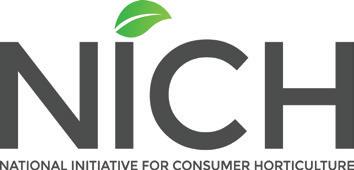
2 minute read
NICH update Gearing up for the 2023 Farm Bill
NICH update
Gearing up for the 2023 Farm Bill
by Ellen M. Bauske, Chair, National Initiative for Consumer Horticulture
It is not too early to think ahead to the 2023 Farm Bill. Traditionally, consumer horticulture exists in a place outside the Farm Bill. Cammie Donaldson, chair of the Farm Bill Committee in the National Initiative for Consumer Horticulture says it is time for that to change.
In her day job, Ms. Donaldson serves as the Executive Director of both the Native Plant Horticulture Foundation and the Florida Association of Native Nurseries. She is also the Administrative Services Manager of the Florida Native Plant Society. The Farm Bill focuses on rural development, forestry, energy, crop insurance, trade, and commodities. In 2007, “Horticulture” was added to include specialty crops, certified organic agriculture and local and regional foods. Key programs include the Specialty Crop Block Grant Program, the Specialty Crop Research Initiative (SCRI), pest and disease prevention programs and nutrition programs targeting fruits and vegetables. “The Farm Bill includes horticultural plant production and consumption but does not recognize the importance of all cultivated plants, particularly those in the built landscape. Ornamental plants in our gardens and landscapes can have a huge impact on climate change, human health and well-being, and helping to preserve biodiversity, particularly pollinators,” notes Cammie.
"As we continue to develop more land, built landscapes are becoming more important in preserving the ecosystem functions we need. Consumer Horticulture has a critical role to play and is an impressive driver of our agricultural economy. It is time for recognition.”
~ Cammie Donaldson “The plant choices people make drive the landscape, irrigation, and tree care industries, creating jobs that benefit the economy and the environment,” according to Mary Kay Woodworth, Executive Director of the Georgia Urban Ag Council.
The USDA’s focus continues to be on the rural economy, and it’s critical that this focus be broadened and updated.
“As an industry, we cannot afford to remain invisible. Those who have been in the industry a while can remember 2007, when outdoor watering was temporarily eliminated simply because regulators and policymakers did not know we existed. It was a harsh blow to the industry,” Woodworth said.
NICH is taking action
NICH is currently in talks with the USDA Office of the Chief Scientist staff and creating webinars on Consumer Horticulture and climate change. We are also developing industry listening sessions so we can bring a united message. Subscribe to our newsletter to find out more:
signup.e2ma.net/signup/1854783/1400854
growing a healthy world through the art, science and business of plants, gardens and landscapes consumerhort.org











